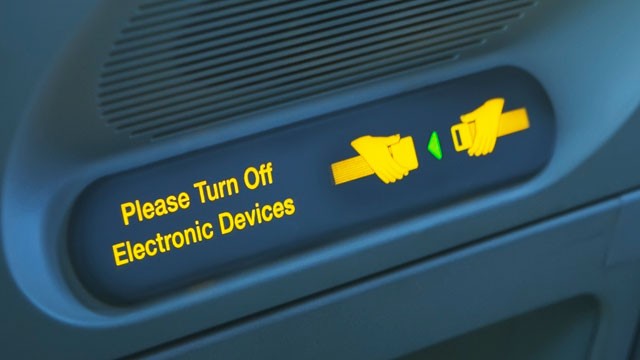The phrase “Please power down anything with an on/off button” will soon no longer be part of the commercial flying routine – in a rare development that actually improves passenger experience.
The Federal Aviation Administration is changing the 50-year-old safety regulation to allow air travelers to use their electronic devices from gate-to-gate, the agency said in a press release Thursday.
The announcement comes one month after an investigatory panel officially recommended that passengers be allowed to use personal devices at any point during a flight. Flyers will now be able to read their e-books, listen to their MP3s, watch their videos and play their games without pesky interruption. Short-range Bluetooth devices, such as wireless keyboards, will be permitted as well.
Aviation experts said that today’s most popular devices use so little power that they’re unable to interfere with a plane’s aeronautics, and modern jets are packed with electronic systems certified to withstand interference.
“Most planes can handle radio interference,” said FAA Administrator Michael Huerta in a statement Thursday. He added that, in low visibility, a mere one percent of flights may not be able to tolerate interference, in which passengers will be asked to switch off electronics.
Keep in mind: FCC regulations still prohibit any airborne calls, so cell phones and tablets will need to be switched to “airplane mode,” meaning no signal bars are displayed. This means passengers still won’t be able to stream videos, exchange emails, texts or download data, unless an on-board Wifi connection is available.
During takeoff and landing, passengers will need to either stow their devices or hold them in their hands, meaning the use of seatback trays will still be prohibited during this time. Flight attendants and safety advocates have expressed concerns that laptops and tablets could turn into dangerous projectiles if a flight encounters turbulence while landing or if a pilot brakes suddenly during takeoff.
Timing is up to the airlines, which are required to submit a plan to the FAA to manage electronics. This will include new training for flight attendants.
The FAA said in a release that it expects airlines to allow the use of devices during all phases of air travel by the end of 2013, but passengers may be granted the privilege even sooner. Delta has already submitted a plan, saying it’s ready to allow use as early as tomorrow (Nov. 1). Delta aircrafts have completed the required PED tolerance testing.
Prior to the change in regulations, as many as 30 percent of passengers admitted they’d accidentally left a device on during takeoff or landing, according to studies by the Airline Passenger Experience Association and the Consumer Electronics Association. Pilots have been using iPads in the cockpit for years, and Delta flight attendants use Nokia Lumia 820s for credit card transactions. It’s about time the general public is given the same rights.
Combined with the TSA’s expanded PreCheck program, travelers may stress a little less this holiday season.

 Save up to 60% on Business Class. Call 1-800-435-8776
Save up to 60% on Business Class. Call 1-800-435-8776

Never so lucky…I’ve hoped after many years of travel, although not what one would call ‘frequent flyer’ status, that I might one day be considered appropriate for an upgrade. I’ve never assumed I’m entitled to it, have prayed that the gods would look kindly on me…lol. Premium economy is ok…but really….what are you getting? A slightly wider seat. Air travel is NOT what it was….sadly:-( no one dresses to travel….it’s as though they’ve just climbed out of bed…even business and or first are not ‘always’ perfectly coiffed…so to encourage the ‘average’ joe to smarten up, in reality, is NOT going to get you and upgrade . I do like the idea though:-)